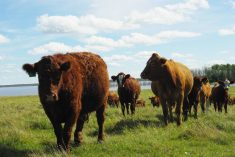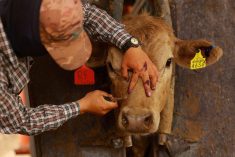A heifer whose tissues tested positive for bovine tuberculosis (TB) at slaughter in the U.S. has been traced back to a Saskatchewan cattle herd which has now turned up two more cases of the disease.
The Canadian Food Inspection Agency, in a report dated Wednesday, said it was notified Feb. 23 by the U.S. Department of Agriculture that tissues from an animal at slaughter had a positive PCR (polymerase chain reaction) test for bovine TB.
The animal in question had been in a U.S. feedlot since last September, when it was exported from Saskatchewan, CFIA said. Before export, it had spent five months in a Canadian feedlot, where all other contact animals were also destined for slaughter and none were moved to other farms.
Read Also

Farmers, traders ‘flying blind’ as U.S. shutdown blocks key crop data
U.S. data vital to global grain and soybean trading has gone dark during the country’s federal government shutdown, leaving commodity traders and farmers without crop production estimates, export sales data and market reports during the peak of the autumn harvest.
The TB-positive heifer’s herd of origin in Saskatchewan was put under quarantine until testing could be done after spring calving, CFIA said. All animals over six months old in that herd were tested for the disease last month.
Any “reactor” animals — that is, the ones that show a response to a standard caudal-fold tuberculin (CFT) test — were taken for slaughter and post-mortem exams.
Tissues from suspect animals were then sent to the agency’s Fallowfield lab at Ottawa, where PCR tests turned up two positive cases of bovine TB on June 19, CFIA said.
In a separate notice to producers Wednesday, CFIA said the new findings “should not affect Canada’s current international status in which all provinces are considered bovine TB-free” — a status which “supports international trade for Canada’s beef industry.”
CFIA said it’s continuing to work “closely” with producers, industry organizations and provincial and federal ag and health authorities in its probe.
The agency said it’s now in the “very early stages” of that investigation — which means identifying all herds that had contact with the infected animal during its life, and testing to identify the strain of the TB bacterium to see if there are any connections to previous cases.
CFIA said it will also trace the movement of animals to and from the infected herd during the past five years to “identify and eliminate the source” and any potential spread of TB.
Quarantines and movement restrictions are placed on any implicated animals, with testing, humane destruction and disposal carried out as required, CFIA said. All animals in the infected herd will be “humanely destroyed,” and affected producers are eligible for compensation for any animals ordered destroyed.
The number of herds the probe will cover, and the time frame needed to complete it, are “not yet known.”
Canada hasn’t booked an outbreak of bovine TB in a domestic cattle herd since 2018, when four cases were found in a British Columbia herd, leading to testing for about 23,000 animals across 42 herds, with almost 1,050 ordered destroyed.
Those four cattle were found to have the same strain, believed to be “most genetically related” to strains isolated in the U.S. from fed cattle of “Mexican or unknown” origin, but no “definitive” source of infection was ever found for the B.C. cattle.
A previous outbreak in a southeastern Alberta cow-calf herd in 2016 — which turned up six TB-positive positive animals with almost 12,000 ordered destroyed out of over 34,000 tested — likewise found no “definitive” source of infection.
The strain in that outbreak was found to stem from a strain first identified in Mexico in 1997, and also had no link to any previous cases in Canada, including the 2018 case.
Bovine TB is federally reportable and has been subject to a mandatory eradication program in Canada since 1923. The disease does not pose a threat to Canadian public health, CFIA said, because of its “extremely low prevalence,” along with ongoing surveillance at packing plants and testing programs in place, and practices such as pasteurization of milk.
Human cases of bovine TB are “very rare,” the agency said. Such infections can occur through fluids from an infected animal passing to an open skin sore, or extended close contact with an animal with active respiratory TB, or consuming raw or unpasteurized products from an infected animal. — Glacier FarmMedia Network
















